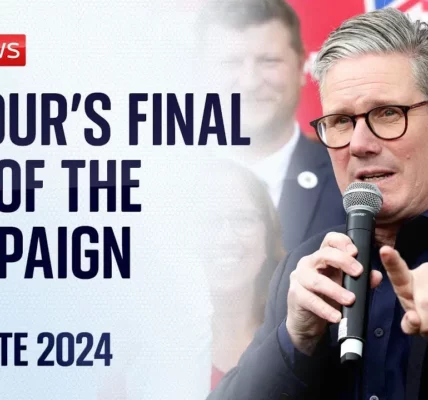Political Discourse: The Prime Minister’s Absence and Its Implications

This article delves into the recent discussions surrounding the Prime Minister’s absence from the Normandy commemoration, examining the political ramifications for the Conservative Party’s election campaign and public perception.
Introduction
The recent political landscape has been significantly shaped by the Prime Minister’s absence during the pivotal Normandy commemoration. This event was not just a historical remembrance but a critical moment reflecting national pride and the sacrifices made during World War II. The implications of this absence have rippled through the Conservative Party’s campaign efforts, raising questions about leadership, accountability, and public sentiment. This article aims to explore these dimensions in detail, highlighting the conversations that have emerged as a result of this incident.
The Prime Minister’s Absence: A Misstep?
During a recent interview, the question was raised about the Prime Minister’s notable absence from the Normandy commemoration, which commemorated the sacrifice of 4,426 soldiers on D-Day. The lack of clarity regarding his absence has prompted criticism and speculation about his priorities, leading to a broader discussion about the government’s commitment to honoring veterans.
Public Reactions
The absence has sparked various reactions from the public and opposition parties, highlighting a perceived disconnect between the Prime Minister and significant national events. Critics have pointed out that such an absence not only reflects poorly on the individual leader but also on the party as a whole.
Apologies and Accountability
In the wake of this criticism, the Prime Minister issued an apology, acknowledging his mistake and expressing regret for not being present. However, questions remain about the nature of his engagements that took precedence over this important memorial.
Campaign Strategies: Navigating Financial Constraints
As the Conservative Party gears up for the upcoming elections, financial constraints have become a prominent concern. Reports have suggested a suspension of social media campaigning due to funding issues, although party representatives have denied these claims, asserting that campaigning remains vigorous.
Social Media and Campaign Effectiveness
- Importance of social media in modern political campaigns
- Strategies for engaging voters online
- Challenges faced by the Conservative Party in digital campaigning
Financial Management and Fundraising Efforts
The party’s financial health is crucial for its campaign success. Effective fundraising strategies will be essential to sustain campaigning efforts and maintain voter engagement. Potential strategies include:
- Leveraging grassroots support for small donations.
- Organizing fundraising events to boost party funds.
- Enhancing transparency about fund allocation and spending.
Political Criticism: The Role of the Opposition
The opposition parties have seized the opportunity to criticize the Prime Minister’s absence, leveraging it to question the credibility and preparedness of the Conservative Party. This criticism plays a significant role in shaping public perception and influencing voter sentiment.
Key Points of Opposition Critique
- Calls for greater accountability from the Prime Minister.
- Questions regarding the leadership’s prioritization of national events.
- Concerns about the implications of leadership decisions on party unity and electoral success.
Impact on Voter Sentiment
With elections on the horizon, the public’s response to these criticisms will be pivotal. Voter sentiment is heavily influenced by perceived leadership capabilities and the ability to represent national interests effectively.
The Future of the Conservative Party
As the Conservative Party navigates these turbulent waters, the future will depend on how effectively they address the criticisms and regain public trust. This includes acknowledging past mistakes and demonstrating a commitment to honoring the nation’s values.
Rebuilding Trust with the Voters
To rebuild trust, the party must focus on:
- Engaging with veterans and veteran organizations.
- Reaffirming commitments to national commemorations and events.
- Promoting transparency in governance and decision-making processes.
Strategic Moves Ahead of the Elections
The party will need to implement strategic moves to bolster its image and electoral prospects, including:
- Enhancing communication strategies to connect with the electorate.
- Launching targeted campaigns that address key voter concerns.
- Emphasizing achievements and future plans that resonate with voters.
Conclusion
The recent discussion surrounding the Prime Minister’s absence from the Normandy commemoration highlights significant challenges for the Conservative Party as it approaches the election. With financial constraints and public criticism looming large, it is imperative for the party to not only address these issues but also to articulate a clear vision for the future. As the political landscape continues to evolve, maintaining voter engagement and trust will be critical for the party’s success. We encourage readers to stay informed and actively participate in the political discourse leading up to the elections.
“`




